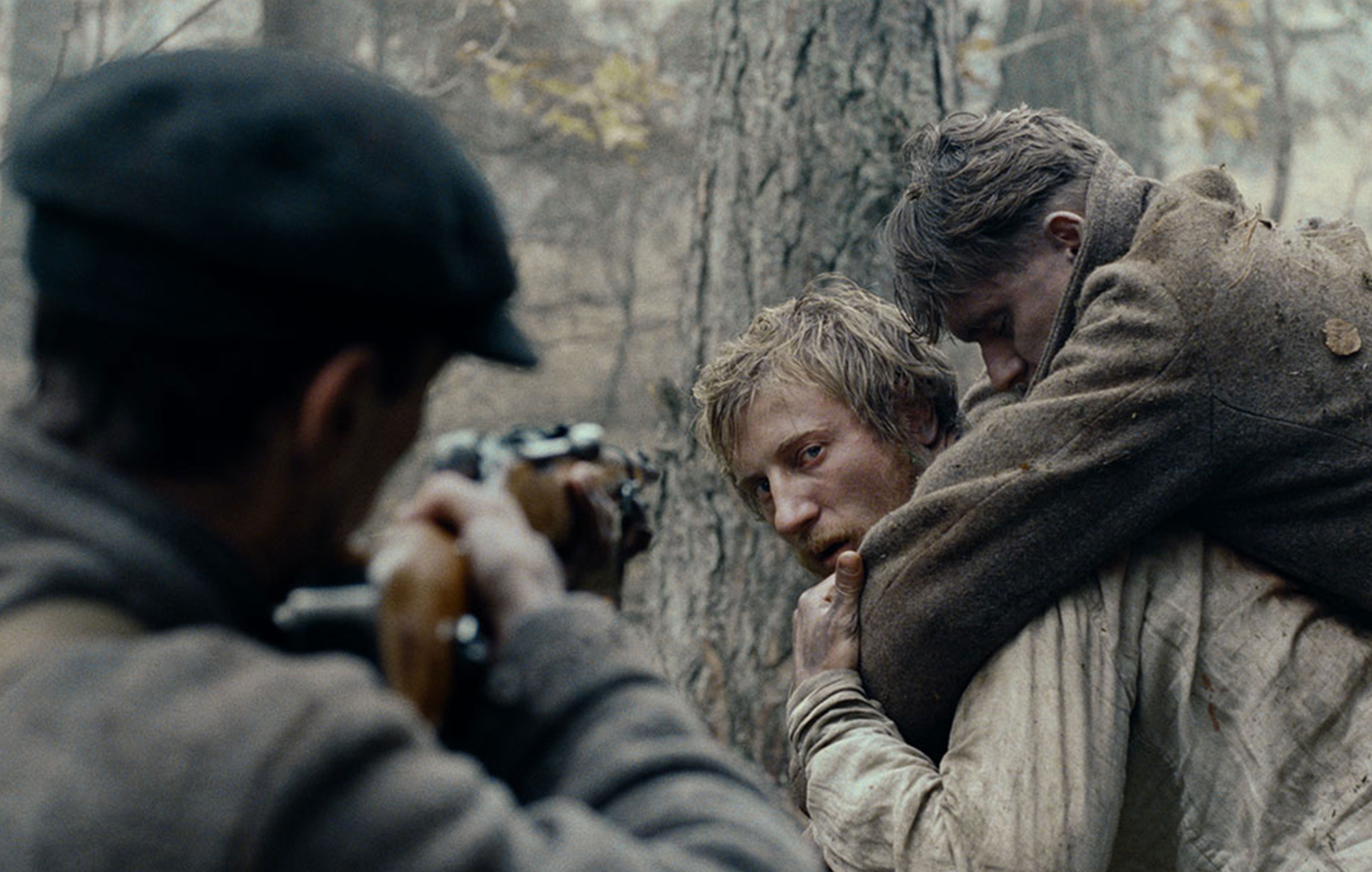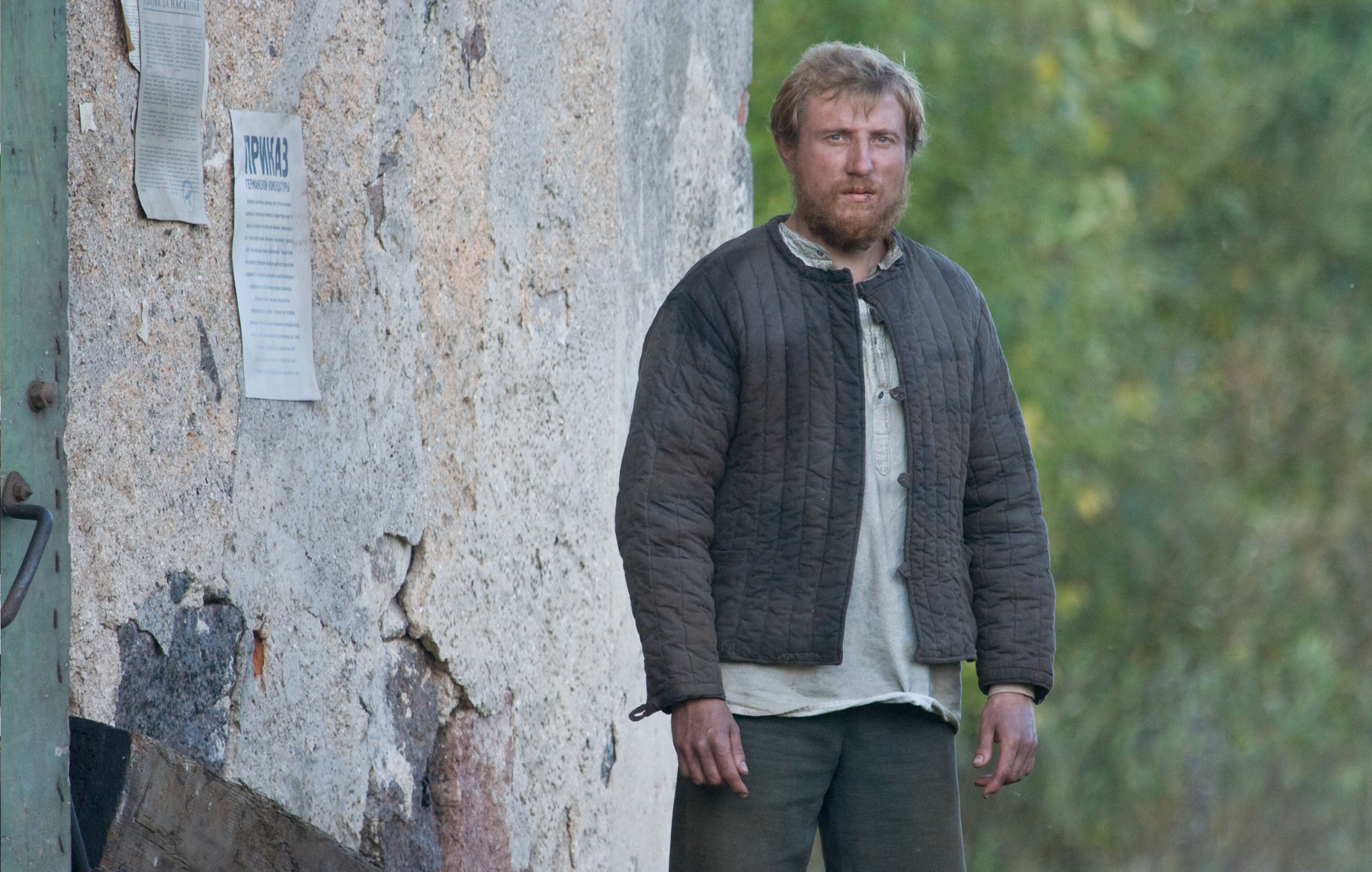IN THE FOG / 2012
SYNOPSIS
Western frontiers of the USSR, 1942. The region is under German occupation, and local partisans are fighting a brutal resistance campaign. A train is derailed not far from the village, where Sushenya, a rail worker, lives with his family. Innocent Sushenya is arrested with a group of saboteurs, but the German officer makes a decision not to hang him with the others and sets him free. Rumours of Sushenya’s treason spread quickly, and partisans Burov and Voitik arrive from the forest to get revenge. As the partisans lead their victim through the forest, they are ambushed, and Sushenya finds himself one-to-one with his wounded enemy. Deep in an ancient forest, where there are neither friends nor enemies, and where the line between treason and heroism disappears, Sushenya is forced to make a moral choice under immoral circumstances.
TECHNICAL SPECIFICATIONS
CREW
CAST
The Condemned Man and His Two Burdensby Manohla Dargis, 2013-06-13, www.nytimes.com
The world and its choices are often cruel, but for all the devastations visited on the characters, Mr. Loznitsa is searching for the human good amid a human catastrophe. The stunning opening scene — a probing sweep around a Bruegel-like tableau of people, dogs and mud — puts that search into cinematic terms and also telegraphs the narrative’s circular form. We go on, circle back, go on.
Film of the week: In the Fogby Hannah McGill , 2013-04-26, www.bfi.org.uk
The heavy tragic faces here, the sorrowful contemplation of our collective lot and the absence of levity of any kind all adhere to national stereotype to a degree that some will find wearing. But the intellectual range is vast, and the images and performances stirring beyond the customary standard. In its thorough meditation on man’s moral place, and its beautiful depiction of one version of life’s trial, lies this film’s joy.
Review: In the FogBy Aaron Light, 2013-06-10, www.filmcomment.com
Loznitsa is still intent on portraying mankind as a writhing, impotent mass of dubious morality and wretched cruelty—life as one long cautionary tale of human folly with a series of inevitably tragic ends. But with In the Fog, he allows his characters good intentions. The film is the director’s big reveal, a glimpse past the steely façade… of My Joy—an expression of his overarching cynicism as a thinly veiled hope for humanity, not a battle cry in favor of its extinction.
It’s hard to see through "In The Fog"by Farran Smith Nehme, 2013-06-14, www.nypost.com
Sergei Loznitsaʼs grim movie fulfills every preconception of a Russian war tale — slow-paced, teeming with dirt and lousy weather, full of moral quandaries endured alongside disgusting food and inadequate clothing. Death haunts “In the Fog” from the first impressive moments, where the camera forces you to share the viewpoint of Belarusian men being marched to a Nazi gallows.
Cannes 2012: In the Fog, Student and the Awardsby Glenn Heath Jr., 2012-05-30, www.thelmagazine.com
As a nightmare of revolving war-film possibilities, In the Fog explores how quickly a character’s trajectory can evolve within such a terrifyingly fluid space. Maybe that’s why its deeply cynical ending doesn’t feel entirely hopeless. Even though the rigors of war are relentless and uncompromising, there are small moments of peace hidden within these tragic compositions, reminders of togetherness that, no matter how fleeting, have to count for something.
Review: In the Fogby Tina Hassannia, 2013-06-13, www.slantmagazine.com
Perhaps the obvious point of comparison for In the Fog, given the endless melancholic long shots in the woods, is the work of Andrei Tarkovsky… But unlike Tarkovsky, who left words unspoken for his characters, Loznitsa occasionally writes his ideas too explicitly in the film’s dialogue, though he makes up for this by deftly employing some ironic symbolism elsewhere.
Cannes 2012: Day 9 - 'In the Fog'by Jordan Cronk, 2012-05-29, www.popmatters.com
The film slowly builds, never reaching a traditional war film climax, but instead stokes equally potent flames as Sushenya delivers a gut-punching final speech before having to choose between honor, friendship, and and his own mortality. It’s a mature move by a mature filmmaker, still only two films deep into what looks to be very promising new direction.
In the Fogby Drew Hunt, 2013-06-19, www.spectrumculture.com
In the Fog is quite nice to look at—most of it unfolds in the picturesque Latvian forest where the film was shot—even as Loznitsa’s authoritative hand removes much of the beauty present in Mutu’s delicate photography. When the film reaches its risible climax… the boundless austerity takes on the air of tragicomedy gone awry.
Review: Sergei Loznitsa's "In the Fog"by Ignatiy Vishnevetsky, 2013-06-20, www.mubi.com
In an era when vague is en vogue—when filmmakers are more likely to find acclaim for posing big questions than for trying to answer them—In the Fogstands out for being resoundingly unambiguous. Everything—camera style, performance, structure, pacing—is in the service of establishing and contextualizing Svirsky’s dilemma.
In the Fog’s WWII Has the Inevitability of an AvalancheBy Michael Atkinson, 2013-06-12, www.villagevoice.com
More accessible and less stupefying than My Joy, In the Fog has the inevitability of an avalanche, and only our overfamilarity with Nazi-tribulation scenarios, and perhaps its excessively punctuated ending, could slow it down. A better anti-summer blockbuster is hard to imagine.
In the Fog: movie reviewby Keith Uhlich, 2013-06-13, www.timeout.com
For a while, [In the Fog] is mysterious and gripping. The whispery sounds of the forest impart a lulling yet tense sensation, as if death could come from anywhere at any moment… But obviousness sets in when the film begins flashing back to the men’s lives before their current dilemma. The initial strangeness wears off as the narrative rhythms become more predictable—enter past, return to present, repeat—and the clichéd existential metaphors pile up.
Cannes 2012: In the Fog, Student and the Awardsby Benjamin Mercer , 2013-05-06, www.thelmagazine.com
Here, the director of the recent My Joy, a bilious road movie that consisted mostly of detours, works with an all-too-clear formal symmetry, fleshed out by characters who essentially function as stand-ins for varying degrees of core-principle durability, as in a fable or a dead-on-arrival joke. But as it shows an already grim scenario growing still more so, this film does approach the punch-to-the-gut thrust of the earlier one…
In the Fogby Michael Koresky, 2013-06-14, www.reverseshot.org
This is neither a tale of redemption (its largely unsullied main character, despite the trials he is put through, is not in need of such things) nor is it a portrait of improbable, Christlike goodness. The film is grounded in the material world, in recognizable human behavior and interaction; its ironies are those of the everyday, delineated in clean, compassionate storytelling strokes that don’t sacrifice complexity for clarity.
TIFF Preview -2 In the FogBY CSCOPE2, 2012-09-01, www.cinema-scope.com
In the Fog doesn’t go as far [as My Joy], but it does impress with its dramatic precision and focus on three men involved in a complex game of blame-taking, revenge-killing and misunderstood motives amongst Byelorussian rebels. It also features the power and thrall of Oleg Mutu’s characteristically intense widescreen cinematography, which Loznitsa uses to frame and imbue his plan-séquence stagings with a steady beat toward doom.
Cannes 2012, Day Nine: The director of Precious drops another prestige stinkbomb and an unfilmable novel gets filmedby Mike D'Angelo, 2012-05-25, www.film.avclub.com
Loznitsa’s previous film, My Joy, was notable for its formal daring and structural gamesmanship, but In the Fog skews much more traditionally festival-elegant, juxtaposing lengthy tracking shots as the men walk or ride through dense forest with locked-down simplicity when they’re at rest. The story is simple, arguably too simple….
In the Fogby Angeliki Coconi, 2020-03-08, www.unsungfilms.com
In the Fog is slower than slow. And it’s exactly that pace that makes it such a good thriller. You hear every breath, every sniff, study every eye and hand movement. Nothing escapes you, the characters are scrutinised with nowhere left to escape. There’s a dead end wherever they look, whatever they try to do.
festivals & awards
- Festival de Cannes, France-Official Selection Competition FIPRESCI-Prize
- Andrey Tarkovsky “Zerkalo” International Film Festival, RussiaGrand Prix for The Feature Best Film
- GOLDEN APRICOT – Yerevan International Film Festival, ArmeniaGolden Apricot for The Best Feature Film
- Odessa International Film Festival, UkraineThe Best Feature Film
- TOFIFEST International Film Festival, PolandThe Best Film Scene
- Cottbus International Film Festival, GermanyPrize for Outstanding Actors
- Cottbus International Film Festival, GermanyPrize of the Ecumenical Jury
- TRIESTE International Film Festival, ItalyBest Film
- Minsk International Film Festival, BelarusGrand Prix „Golden Listapad“
- Toronto International Film Festival
- International Film Festival Rotterdam
- San Francisco International Film Festival
- Tribeca Film Festival
- AFI FEST
- Karlovy Vary International Film Festival
- Russian Guild of Film CriticsBest Actor (White Elephant)
- Russian Guild of Film CriticsBest Cinematographer (White Elephant)


